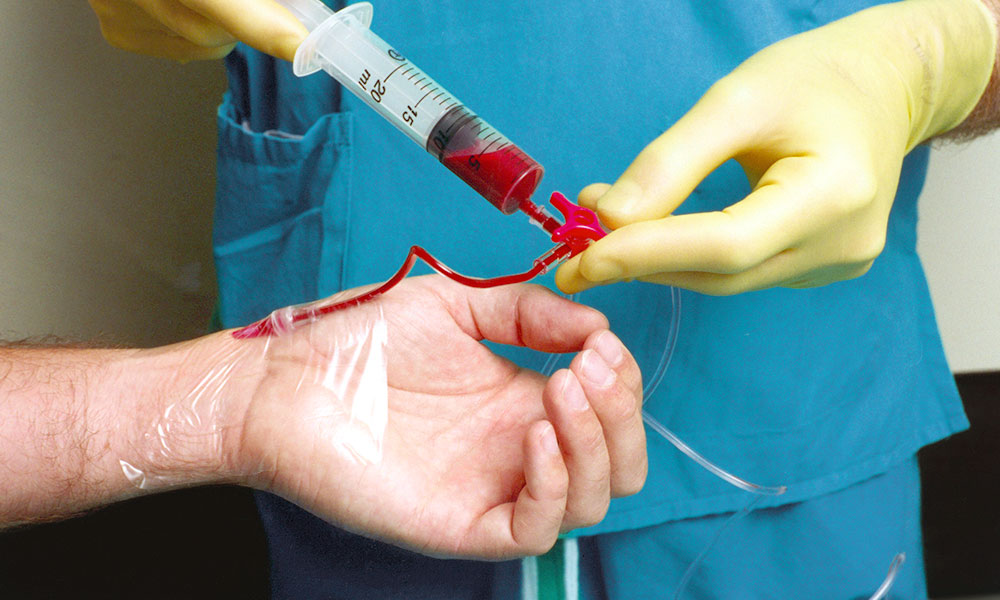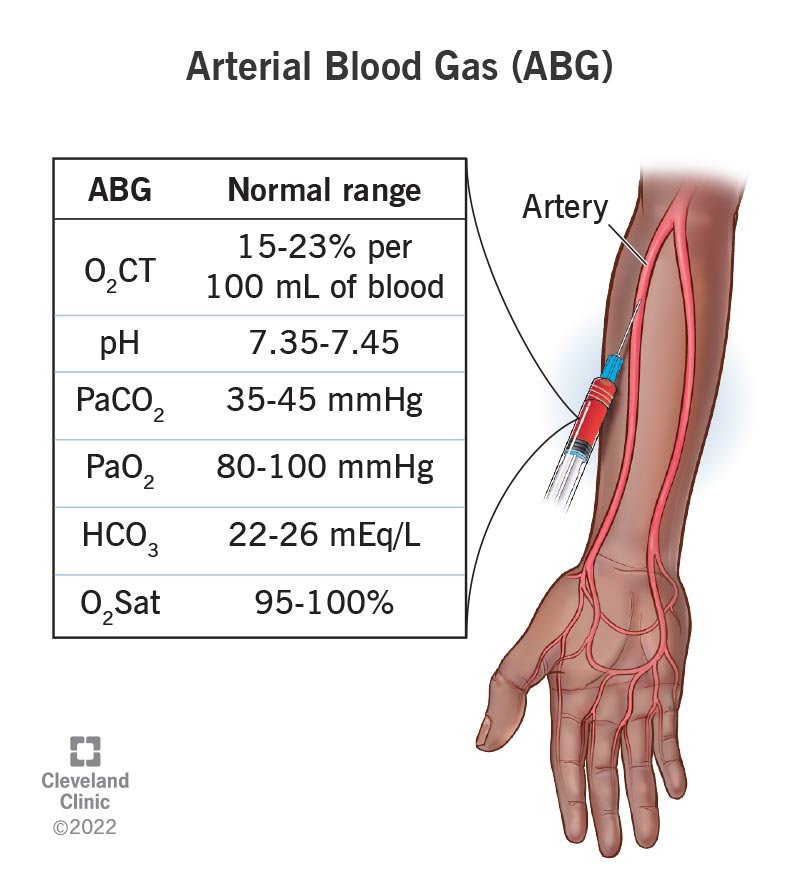Draw Arterial Blood Gas
Draw Arterial Blood Gas - Blood can be drawn via an arterial stick from the wrist, groin, or above the elbow. It also checks the blood ph balance to see if your blood is too acid or alkaline. They might use ultrasound imaging to help find an artery. Web arterial blood ph, which indicates the amount of hydrogen ions in blood. This chapter describes only the procedure for a radial artery blood draw. Vincent lopez rowe, md, facs more. Web taking an arterial blood gas (abg) involves using a needle and syringe to directly sample blood from an artery (typically the radial artery). Interpreting arterial blood gas imbalances. Web an arterial blood gas (abg) is a test that measures the oxygen tension (pao 2 ), carbon dioxide tension (paco 2 ), acidity (ph), oxyhemoglobin saturation (sao 2 ), and bicarbonate (hco 3) concentration in arterial blood. A ph of less than 7.0 is called acidic, and a ph greater than 7.0 is called basic, or alkaline. It is a fundamental skill. [2] pao 2 provides information on the oxygenation status, and paco 2 offers information on the ventilation status (chronic or acute respiratory failure). The test can help assess for acute and chronic respiratory, kidney, and heart conditions. Blood is most commonly drawn from the radial artery because it is easily accessible, can be compressed to. Web what to expect. You’ll sit in a chair or lie in a medical bed, and a respiratory therapist will look for an artery, usually in your inner wrist. Basically, if it’s lower than normal, it’s acidic. Web what is arterial blood gas? A ph of less than 7.0 is called acidic, and a ph greater than 7.0 is called. What are the components of arterial blood gas? Web an arterial blood gas test, commonly known as an abg, is performed on blood that is drawn from an artery. Web taking an arterial blood gas (abg) involves using a needle and syringe to directly sample blood from an artery (typically the radial artery). A ph of less than 7.0 is. It also checks the acidity of your blood. Web what is this test? This chapter describes only the procedure for a radial artery blood draw. Abg tests are used to evaluate respiratory and kidney functions and give an overall look into the body's metabolic state. They might use ultrasound imaging to help find an artery. Some blood gas analyzers also measure the methemoglobin, carboxyhemoglobin, and hemoglobin levels. The test can also show blood ph. For the patient in critical care requiring multiple blood. An arterial blood gas analysis (abg) measures the balance of oxygen and carbon dioxide in your blood to see how well your lungs are working. The radial artery on the wrist is. This is the measure of acids and bases in the blood. What are the components of arterial blood gas? Web an arterial blood gas (abg) test measures the amount of oxygen and carbon dioxide in your blood. It also checks the acidity of your blood. Web an arterial blood gas (abg) explicitly tests blood taken from an artery. It is used to see how well the lungs are functioning and to determine the effectiveness of respiratory therapies, such as the use of a ventilator, cpap, bipap, or oxygen. To date, no large studies have been conducted on the major complication rate of aps. Abg analysis assesses the patient's partial pressures of oxygen (pao 2 ) and carbon dioxide. This chapter describes only the procedure for a radial artery blood draw. Web what to expect. An arterial blood gas analysis (abg) measures the balance of oxygen and carbon dioxide in your blood to see how well your lungs are working. You’ll sit in a chair or lie in a medical bed, and a respiratory therapist will look for an. Web how to draw an abg. Paco2 (partial pressure of carbon dioxide) pao2 (partial pressure of oxygen) so2 (oxygen saturation) hco3 (bicarbonate) be (base excess) normal values in arterial blood gas. Web arterial blood gas (abg) testing is a diagnostic test performed on blood taken from an artery that provides a glimpse of how much oxygen and carbon dioxide are. They might use ultrasound imaging to help find an artery. This is the measure of acids and bases in the blood. Paco2 (partial pressure of carbon dioxide) pao2 (partial pressure of oxygen) so2 (oxygen saturation) hco3 (bicarbonate) be (base excess) normal values in arterial blood gas. Blood is most commonly drawn from the radial artery because it is easily accessible,. What are the components of arterial blood gas? We aimed to describe the risk of major complications within 7 days after puncture and investigate whether using antithrombotic medication affected this. The radial artery on the wrist is most commonly used to obtain the sample. Web an arterial blood gas test, commonly known as an abg, is performed on blood that is drawn from an artery. You’ll sit in a chair or lie in a medical bed, and a respiratory therapist will look for an artery, usually in your inner wrist. Web an arterial blood gas (abg) test measures the amount of oxygen and carbon dioxide in your blood. A blood gas test measures oxygen and carbon dioxide levels in the blood. Web taking an arterial blood gas (abg) involves using a needle and syringe to directly sample blood from an artery (typically the radial artery). It also checks the blood ph balance to see if your blood is too acid or alkaline. An arterial blood gas analysis (abg) measures the balance of oxygen and carbon dioxide in your blood to see how well your lungs are working. It is used to see how well the lungs are functioning and to determine the effectiveness of respiratory therapies, such as the use of a ventilator, cpap, bipap, or oxygen. Web what to expect. For the patient in critical care requiring multiple blood. Some blood gas analyzers also measure the methemoglobin, carboxyhemoglobin, and hemoglobin levels. Web the sample can be obtained either through a catheter placed in an artery, or by using a needle and syringe to puncture an artery. Blood is most commonly drawn from the radial artery because it is easily accessible, can be compressed to control bleeding, and has less risk for vascular occlusion.
Simplified Arterial Blood Gases Simplified Nursing

How to Draw an Arterial Blood Gas 9 Steps (with Pictures)

Nurse Nightingale {ABGs} Arterial Blood Gases The Ultimate Beginners
Arterial Blood Gas (ABG) What It Is, Purpose, Procedure & Levels

ARTERIAL BLOOD GAS ANALYSIS Nurse Info

Arterial Blood Gas (ABG) Procedure OSCE Demonstration YouTube

Arterial Blood Gases (ABG) — Medistudents

Basic Arterial Blood Gas Interpretation

Arterial Blood Gas (ABG) Interpretation • AG/nonAG GrepMed

Arterial Blood Gas (ABGs) Analysis Ultimate Guide Nurseslabs
Web An Arterial Blood Gas (Abg) Explicitly Tests Blood Taken From An Artery.
Basically, If It’s Lower Than Normal, It’s Acidic.
However, The Necessary Sample Of Arterial Blood Can Be Difficult To Obtain Due To Diminished Pulses Or Patient Movement.
Paco2 (Partial Pressure Of Carbon Dioxide) Pao2 (Partial Pressure Of Oxygen) So2 (Oxygen Saturation) Hco3 (Bicarbonate) Be (Base Excess) Normal Values In Arterial Blood Gas.
Related Post:
